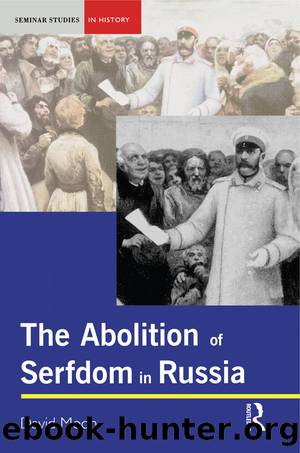The Abolition of Serfdom in Russia by David Moon

Author:David Moon [Moon, David]
Language: eng
Format: epub
Tags: History, Russia & the Former Soviet Union, Europe, General
ISBN: 9781317886150
Google: 9VGgBAAAQBAJ
Publisher: Routledge
Published: 2014-09-25T16:07:38+00:00
POPULAR MONARCHISM
The peasantsâ responses to the abolition of serfdom â in particular the persistent hopes that the tsar would grant them âfull freedomâ from the nobility and all the land â raise important questions about peasant attitudes to the tsar. The belief that the nobles and officials were concealing the âreal freedomâ in the spring of 1861 was typical of a recurring popular belief that the tsar was on the side of the peasants, but the âboyarsâ â in this case the nobles and officials â were preventing him from achieving his aim of helping them. Some historians, both Soviet and Western, have argued that this apparent peasant faith in the tsar was ânaiveâ, as it was divorced from a reality in which successive tsars had actively supported the exploitation and oppression of generations of peasants. Moreover, the terms of the reform of 1861 did not, and any such reform was never likely to, meet the aspirations of the peasantry. Scholars taking this view of peasant attitudes to the tsar have tended to stress their ignorance, superstition, and very low level of awareness of the reality of the political structure of the autocracy.
More sophisticated analyses of peasant attitudes to the tsar, such as Fieldâs study of the Bezdna affair, have suggested that peasants may not have been as politically naive as they have sometimes been portrayed. Field suggested that the peasants at Bezdna and elsewhere may have been claiming their belief in the tsarâs benevolence in order to conform to the authoritiesâ perceptions of them as childlike and devoted to their âlittle fatherâ the tsar, but gullible and easily led astray. Thus, Field implied, the peasants at Bezdna were trying to put forward their ideas about the sort of reform they were expecting by presenting them as the alleged real wishes of the tsar. The peasantsâ apparent intention was to try to attain some concessions from the authorities in their interests. Indeed, some highly educated nobles, for example those of Tver province in their address to the tsar in early 1862, adopted a similar strategy [Doc. 24]. In the case of the peasants, by claiming to be acting out of loyalty to the tsar they could plead they had been motivated by devotion to the tsar and had not rebelled against the authorities, hence the title of Fieldâs book: Rebels in the Name of the Tsar. The massacres at Bezdna and Kandeevka are examples where this strategy went badly wrong. In other cases, however, peasants did extract some, mostly limited, concessions (Field, 1976b: 92, 208â15; Perrie, 1999).
Download
This site does not store any files on its server. We only index and link to content provided by other sites. Please contact the content providers to delete copyright contents if any and email us, we'll remove relevant links or contents immediately.
| Anthropology | Archaeology |
| Philosophy | Politics & Government |
| Social Sciences | Sociology |
| Women's Studies |
The Secret History by Donna Tartt(19046)
The Social Justice Warrior Handbook by Lisa De Pasquale(12185)
Thirteen Reasons Why by Jay Asher(8889)
This Is How You Lose Her by Junot Diaz(6875)
Weapons of Math Destruction by Cathy O'Neil(6264)
Zero to One by Peter Thiel(5786)
Beartown by Fredrik Backman(5737)
The Myth of the Strong Leader by Archie Brown(5496)
The Fire Next Time by James Baldwin(5429)
How Democracies Die by Steven Levitsky & Daniel Ziblatt(5213)
Promise Me, Dad by Joe Biden(5141)
Stone's Rules by Roger Stone(5080)
A Higher Loyalty: Truth, Lies, and Leadership by James Comey(4950)
100 Deadly Skills by Clint Emerson(4919)
Rise and Kill First by Ronen Bergman(4778)
Secrecy World by Jake Bernstein(4740)
The David Icke Guide to the Global Conspiracy (and how to end it) by David Icke(4699)
The Farm by Tom Rob Smith(4502)
The Doomsday Machine by Daniel Ellsberg(4484)
